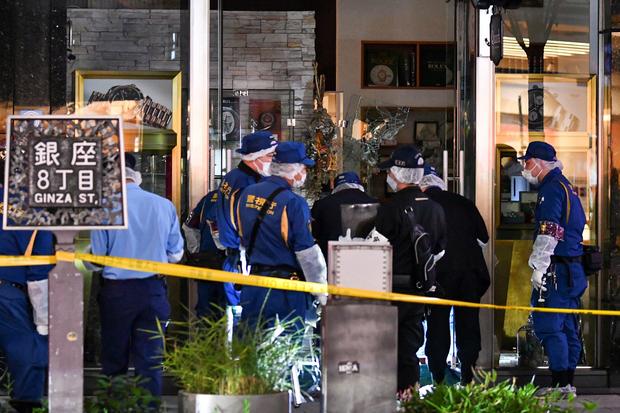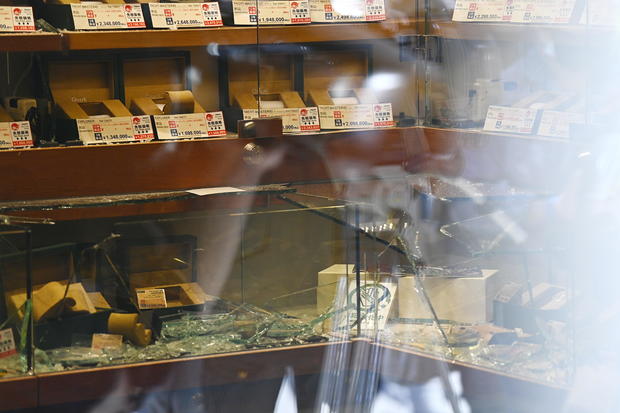Brazen, amateurish Tokyo heist highlights rising trend as Japan's gangs lure desperate youth into crime
Tokyo — When three men armed with crowbars ransacked a luxury watch shop in broad daylight in Tokyo's posh Ginza shopping district this week, onlookers stood by and watched the robbery play out in baffled amazement.
Dressed in black outfits and white costume masks, the thieves smashed through the Quark watch store's showcases on a heavily traveled street, undeterred by blaring security alarms and rubbernecking passersby. Several witnesses recorded the whole heist on their phones, right up until the thieves ran to their rented getaway van and then sped through a red light, door still open, to escape.
Local networks said the hapless thieves, pursued by at least four patrol cars, likely drove right past the imposing National Police Agency headquarters and the country's parliament.
Trapped in a dead-end alley not even two miles away, the suspects scattered on foot — still being recorded on various dumbstruck witnesses' smartphones. One surrendered after literally being talked off a ledge. Another hysterically begged police to stop hurting him while he was being subdued. Less than an hour after the episode began, all four, including the getaway driver, were in custody.
Police have recovered about 70 of the nearly 100 watches stolen, worth more than $700,000.
All of the suspects are between the ages of 16 and 19.
"Yami-baito": Exploitation for crime
The young bandits have told police they were strangers who met for the first time on the "job." The utterly brazen, strangely amateurish robbery bore all the hallmarks of "yami-baito," or black-market part-time jobs, an increasingly lucrative angle for criminal groups allowing them to outsource scams and burglaries to the young, naïve and financially desperate. With the use of yami-baito, it's possible for such gangs to do the crime without doing the time.
Yami-baito ads reel in pawns with promises like "Big money!", "Fast cash," and "Beginners welcome."
The Yomiuri newspaper, citing police statistics, noted about 50 yami-baito-related robberies and thefts starting in mid-2021. Many of those arrested were in their teens and twenties. Another group of youths, who fomented a crime wave stretching across six of Japan's prefectures, said they had been hired via Instagram.
University of Shizuoka professor Hiroshi Tsutomi told the newspaper the youths "apparently feared their ringleader more than the threat of arrest." Rising poverty coupled with the ease of online recruiting, he said, was making young people easy marks to serve as "disposable" tools for experienced organized crime groups.
The watch store break-in was the fifth similarly brazen robbery carried out by amateurs hitting precious metal dealers or jewelers in Tokyo since March. A dumbfounded investigator told the Tokyo Shimbun newspaper that "young people don't seem to understand this crime will definitely get them arrested."
A fast-growing trend
Tokyo's Metropolitan Police said they found nearly 3,500 yami-baito listings on Twitter last year, reflecting a year-on-year increase of more than 50% despite efforts to stamp out the ads. Yami-baito crime rings have been known to advertise even on legitimate job-listing websites.
When reporters from the Mainichi newspaper applied for yami-baito jobs, they were immediately directed to communicate via the encrypted Telegram app, and offered work as phone scammers earning more than $20,000 a month.
Baited and blackmailed
Once young people sign up for black-market jobs, many find it hard to quit. Police say that crime bosses control recruits through coercion, including by threatening violence against family members.
In one typical case, police arrested 20-year-old Yuna Hatakenaka in late April. She told police she "realized it was a scam, but I had already given (the crime group) my photo ID and a video of my parents' home, so I felt I had no choice but commit the crime."
She and accomplices, impersonating police officers, had conned an elderly woman into handing over her bank ATM cards.
Former prosecutor Mikio Uehara said the crime groups exert "mental control that makes it so that those caught up in them can't even think of saying they will leave."








